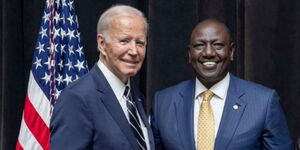The Kenyan shilling on Friday, May 3, made a comeback to strengthen against the United States dollar after several days of weakening.
Traders cited the gain by the local currency to an increase in remittance inflows by Kenyans living in the diaspora.
Another reason for the stability of the shilling on Friday was the surge in inflows from exports, particularly on tea which attracted a higher return on the international markets.
According to the forex traders, increased transactions by non-governmental organisations also played a crucial role in the stability of the local currency against the dollar.
The increase in dollar inflow by the non-governmental sector matched the demand for the dollar by the manufacturing sector thus resulting in the stability of the shilling.
As of Friday, the shilling traded at Ksh134.50/135.50 per US dollar, according to the foreign exchange experts, this was the same level it closed on Thursday, May 2.
For the past three weeks, the shilling weakened against the greenback due to a higher demand for the dollar by manufacturers.
The fuel and manufacturing sector demanded more dollars to purchase raw materials for their industries and thus needed foreign currency to complete their transactions on the international front.
The local currency has been on the decline since mid-March, giving back some of 2024's gains because of the strong return of manufacturing-sector foreign-currency demand.
However, despite the three-week decline, the shilling was marked as the best-performing currency globally, currently at a 16 per cent improvement, a slight drop f from its 20 per cent improvement in early March.
In February this year, the shilling kicked off its gains as it strengthened against major currencies globally including the dollar.
The gains were attributed to the government's decision to buy back part of its Ksh 310 billion ($2 billion), 2014 Eurobond which matures in June this year.
The repayment was made by another new Eurobond worth Ksh233 billion ($1.5 billion) issued by the government in February, the Treasury announced.












